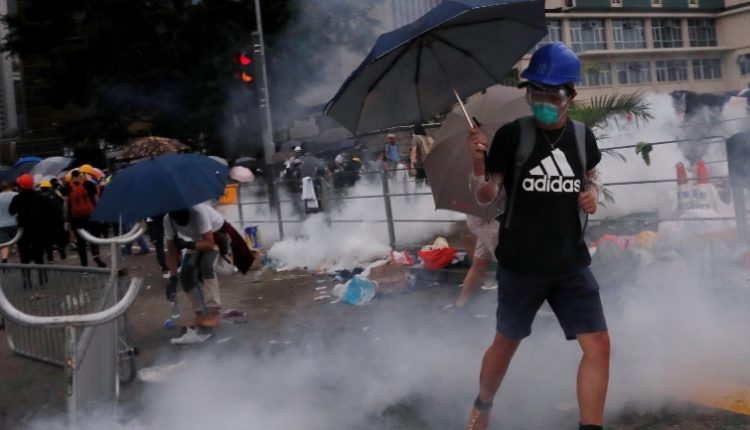Hong Kong police fired rubber bullets and tear gas at demonstrators who threw plastic bottles on Wednesday as protests against an extradition bill that would allow people to be sent to mainland China for trial turned to violent chaos.
Tens of thousands of protesters had gathered peacefully outside the Chinese-ruled city’s legislature before tempers flared, some charging police with umbrellas.
Police warned them back, saying: “We will use force.”
Ambulances were heading toward the protest area as panic spread through the crowd, many people trying to flee the stinging tear gas. Some shops were putting up their shutters at the nearby IFC, one of Hong Kong’s tallest buildings.
Protesters “must stop the violence”, police chief Stephen Lo said, warning residents to stay away from a “riot situation”. He confirmed police were using plastic bullets.
The protesters, most of them young people dressed in black, had erected barricades as they prepared to hunker down for an extended occupation of the area, in scenes reminiscent of pro-democracy “Occupy” protests that gridlocked the former British colony in 2014.
Protesters rallied in and around Lung Wo Road, a main east-west artery near the offices of embattled Hong Kong Chief Executive Carrie Lam, as hundreds of armed riot police first warned them to halt.
“Didn’t we say at the end of the Umbrella movement we would be back?” pro-democracy lawmaker Claudia Mo said, referring to the name often used for the 2014 demonstrations, whose trademark was the yellow umbrella.
“Now we are back!” she said as supporters echoed her words.
Others once again called for Lam to step down.
Opposition to the bill on Sunday triggered Hong Kong’s biggest political demonstration since its handover from British to Chinese rule in 1997 under a “once country, two systems” deal guaranteeing it special autonomy, including freedom of assembly, free press and independent judiciary.
But many accuse China of extensive meddling since, including obstruction of democratic reforms, interference with local elections and of being behind the disappearance of five Hong Kong-based booksellers, starting in 2015, who specialized in works critical of Chinese leaders.
Lam has vowed to press ahead with the legislation despite deep concerns in the Asian financial hub, including among business leaders, that it could undermine those freedoms and investor confidence and erode the city’s competitive advantages.
The government said debate on the bill that was due to take place in the city’s 70-seat Legislative Council on Wednesday would be delayed until further notice.
The legislature is controlled by a pro-Beijing majority.
“We won’t leave till they scrap the law,” said one young man wearing a black mask and gloves.
“Carrie Lam has underestimated us. We won’t let her get away with this.”
China reiterated its support for the legislation.
“Any actions that harm Hong Kong’s prosperity and stability are opposed by mainstream public opinion in Hong Kong,” Chinese foreign ministry spokesman Geng Shuang told reporters.
Asked about rumors that more Chinese security forces were going to be sent to Hong Kong, Geng said that was “fake news”.
The rally was within sight of the Hong Kong garrison of China’s People’s Liberation Army, whose presence in the city has been one of the most sensitive elements of the 1997 handover.
Many of the protesters, who skipped work, school or university to join the rally, defied police calls to retreat and passed around provisions, including medical supplies, goggles, water and food.
Some stockpiled bricks broken away from pavements.
Chief Secretary Matthew Cheung urged the protesters to stop blocking the road and appealed for calm and restraint. “We also appeal to the people who are stationed to … disperse as soon as possible, and not to try to defy/challenge the law,” he said.
The demonstrators rallied just a stone’s throw from the heart of the financial center, where glittering skyscrapers house the offices of some of the world’s biggest companies, including HSBC.
Standard Chartered, Bank of East Asia and HSBC suspended bank operations at some branches in the area.
The proposed bill has attracted widespread criticism at home and abroad, prompting rare criticism from judges, Hong Kong’s business community, some pro-establishment figures and several foreign governments and business chambers.
Lam has sought to soothe public concerns and said her administration was creating additional amendments to the bill, including safeguarding human rights.
Under the proposed law, Hong Kong residents, as well as foreign and Chinese nationals living or traveling through the city, would all be at risk if they were wanted on the mainland.
Sunday’s protest, which organizers said saw more than a million people take to the streets, in addition to a growing backlash against the extradition bill, could raise questions about Lam’s ability to govern effectively.
The failure of the 2014 protests to wrest concessions on democracy from Beijing, coupled with the prosecutions of at least 100 mostly young protesters, initially discouraged many from returning to the streets. That changed on Sunday.
Human rights groups have repeatedly cited the alleged use of torture, arbitrary detentions, forced confessions and problems accessing lawyers in China, where courts are controlled by the Communist Party, as reasons why the Hong Kong bill should not proceed.
China denies accusations that it tramples on human rights and official media said this week “foreign forces” were trying to damage China by creating chaos over the extradition bill.
source: Reuters


